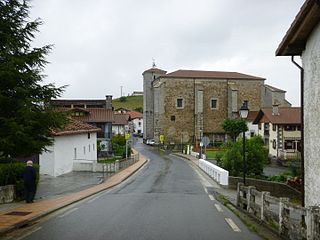
Abaltzisketa is a town located in the province of Gipuzkoa, in the autonomous community of Basque Country, in the north of Spain. In 2014, Abaltzisketa had a total population of 329.

Aduna is a town located in the province of Gipuzkoa, in the autonomous community of Basque Country, in the North of Spain. In 2003, Aduna had a total population of 341.

Alegia is a town located in the province of Gipuzkoa, in the autonomous community of the Basque Country, in the North of Spain. In 2014 Alegia had a total population of 1,744.

Anoeta is a town located in the province of Gipuzkoa, in the autonomous community of Basque Country, in the north of Spain.

Amezketa is a town located in the province of Gipuzkoa, in the Basque Autonomous Community, in the North of Spain. It is located at the foot of Txindoki.

Aretxabaleta is a town in the province of Gipuzkoa, in the Autonomous Community of Basque Country, northern Spain.
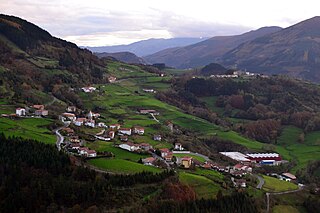
Belauntza is a town located in the province of Gipuzkoa, in the autonomous community of Basque Country, northern Spain.
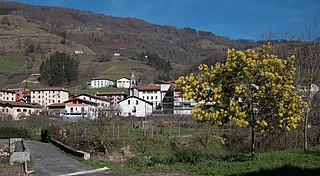
Berrobi is a town located in the province of Gipuzkoa, in the autonomous community of Basque Country, northern Spain.
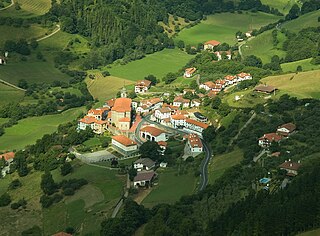
Errezil is a town in the province of Gipuzkoa in the autonomous community of Basque Country, located in the north of Spain. According to the 2016 Basque sociological survey, Errezil has the largest percentage of Basque language speakers of any municipality in the Basque Country, with over 90% of Errezil respondents reporting Basque as their first language and/or reporting speaking Basque at home.
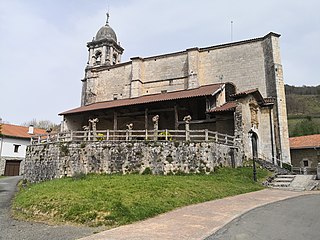
Gaztelu is a village and municipality located in the province of Gipuzkoa, in the autonomous community of Basque Country, northern Spain.

Hernialde is a town located in the province of Gipuzkoa, in the autonomous community of Basque Country, northern Spain.

Ikaztegieta is a town located in the province of Gipuzkoa, in the Autonomous Community of Basque Country, northern Spain.

Irura is a town located in the province of Gipuzkoa, in the autonomous community of Basque Country, northern Spain.
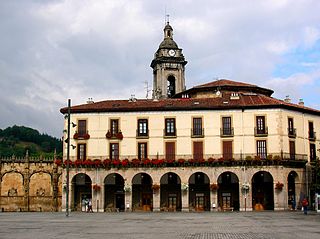
Oñati is a town located in the province of Gipuzkoa, in the autonomous community of the Basque Country, in the north of Spain. It has a population of approximately 10,500 and lies in a valley in the center of the Basque country. It lies about 40 kilometres south of the Bay of Biscay and is about 236 metres above sea level. The name is Basque and translates roughly as "place of many hills", reflecting the landscape of the area. The town is surrounded on three sides by green mountains on the southern side by the Aloña limestone formation.

Pasaia is a town and municipality located in the province of Gipuzkoa in the Basque Autonomous Community of northern Spain. It is a fishing community, commercial port and the birthplace of the famous admiral Blas de Lezo and of the fashion designer Paco Rabanne.

Urnieta is a town located in the province of Gipuzkoa, in the Autonomous Community of Basque Country, northern Spain.

Urretxu is a town located in the province of Gipuzkoa, in the Autonomous Community of the Basque Country, northern Spain.
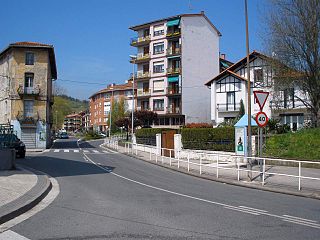
Zizurkil is a town located in the province of Gipuzkoa, in the Autonomous Community of Basque Country, northern Spain.

Cambo-les-Bains is a town in the traditional Basque province of Labourd, now in the Pyrénées-Atlantiques department in south-western France. It lies on the south-western bank of the river Nive. Cambo-les-Bains station has rail connections to Saint-Jean-Pied-de-Port and Bayonne.
Aizkolaritza is the Basque name for a type of wood-chopping competition. They are a popular form of herri kirol in the Basque Country. Competitions are commonly held at most festivals, especially town festivals and usually involve at least two individuals or teams competing against each other.























